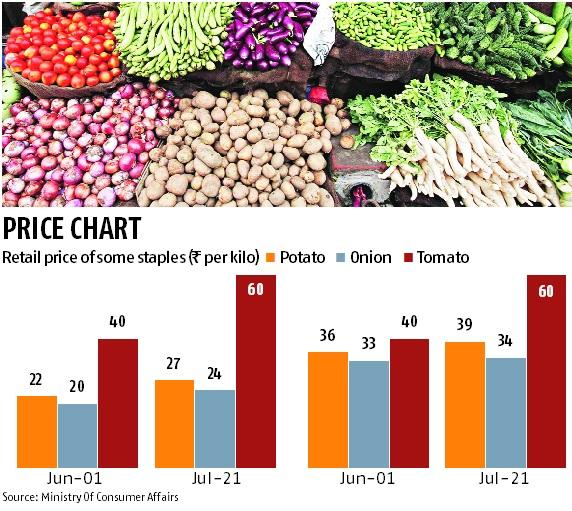Green vegetables have to hit the market in a day, but the fresh lockdown will upend the system. “This will mean lower prices for farmers, but consumers will have to pay more,” says Patit Paban De, member of the West Bengal Cold Storage Association.
As cities and states reimpose localised mini lockdowns to control the spread of the contagion, fruit and vegetable suppliers worry about the impact on their businesses.
Essential supplies have been kept out of the purview, but traders feel if distribution channels are frequently disrupted, this could lead to price escalation and damage, given most have limited holding capacity.
In West Bengal, De said the weekly lockdown could hit the supply of fruit and vegetables and, in turn, have a bearing on prices.
He said root vegetables can be stored in cold storages for a day or two, but green vegetables have to hit the market in a day. “In the retail market, potato prices have already increased to Rs 28-29 a kilo, though much of it is due to low production. But supply disruption, too, has a role to play,” observed De.
In Maharashtra, where the district authorities have reimposed localised lockdowns in several cities and towns, including Pune and Sholapur, to stem the outbreak, farmers and traders have started counting their losses the impact of such ad-hoc lockdowns will have on their horticulture crops.
They said due to recurrent lockdowns, a large haul of fruit, vegetables, and flowers have remained unsold. To put paid to their hopes, labour and logistics availability have also come to naught.
In parts of Maharashtra, prices of tomato have jumped to around Rs 60 per kilo, against Rs 35-40 per kilo a week back, while potato prices have increased to over Rs 35 per kilo, from Rs 25-30 a kilo some days back.
ALSO READ: 81 stalled housing projects approved for funding under special window
Other greens like cauliflower, ladies finger, brinjal, and cucumber, too, are pinching the pockets of consumers.
Apple, too, has become the forbidden fruit, selling in the retail markets at Rs 200 per kilo, against Rs 140-160 per kilo a month ago. The humble banana is priced at Rs 60 for a dozen, from Rs 40 a dozen in the western Mumbai suburb of Virar.
While the price increase can be partly attributed to incessant rains hurting the movement of goods from the hinterlands to cities, repeated lockdowns have been like a dog in the manger.
Samarendra Nath Banerjee, vice-president of Kolkata’s Lake Market Association, concurs. He said most sellers have decided to reduce the supply of fruit and vegetables since they are perishable.
The West Bengal administration had on Monday said community transmission of the novel coronavirus has been recorded in a few areas of the state and had announced there will be complete lockdown for two days every week till August 31 to contain the spread of the contagion. This week, the total lockdown will be in force on July 23 and July 25. Next week, the lockdown will be in force on July 29.

“This means sellers will have to do some advance planning,” West Bengal Chief Minister Mamata Banerjee had said on the bi-weekly lockdown.
“Due to certain agricultural produce market committees (APMCs) deciding to shut markets in regions like Unjha (Gujarat) as preventive measures to mitigate the spread, grain and pulses farmers have witnessed a week’s delay in sales of their produce. Since these have a longer storage life, they were able to resume sales once the markets reopened,” said Bharatiya Kisan Sangh’s Gujarat unit president Vitthal Dudhatra.
To tide over the difficulties due to incessant shutdowns, several farmers in Maharashtra have turned into aggregators and started selling their produce without the help of mandis or agents.
They have started contracting with bulk consumers like hypermarkets and co-operative housing societies to sell their produce directly.
“This is a win-win situation for farmers and consumers. This way, farmers eliminate the five to six layers of arhtiyas (commission agents) and take the full price of their agricultural produce. The government’s decision to allow farmers to sell their produce outside mandis has proved beneficial,” said Sunil Singatkar, director, APMC Vashi. Clearly, the Covid-19 pandemic is showing newer ways to carry on with life.
With inputs from Ishita Ayan Dutt, Vinay Umarji, Dilip K Jha, & Sanjeeb Mukherjee
"vegetable" - Google News
July 23, 2020 at 09:31PM
https://ift.tt/3eUOd0c
A dog in the manger: Mini lockdowns hurt farmers, push up vegetable prices - Business Standard
"vegetable" - Google News
https://ift.tt/2CyIOeE
https://ift.tt/3aVzfVV
Bagikan Berita Ini














0 Response to "A dog in the manger: Mini lockdowns hurt farmers, push up vegetable prices - Business Standard"
Post a Comment